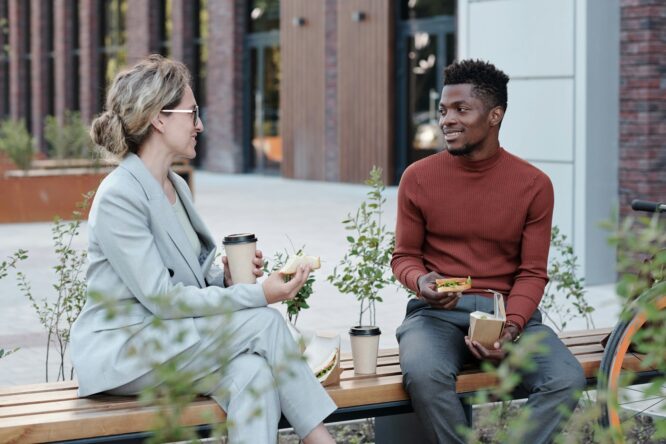There’s something fascinating about watching people who’ve mastered the art of dealing with tough conversations.

They don’t seem to get pulled into the drama or feel the need to “win” every discussion. Instead, they’ve figured out a completely different approach to dealing with conflict and disagreement. It’s not that they’re pushovers or avoid tough topics altogether. They’ve just learned that arguing rarely changes anyone’s mind and often leaves everyone feeling worse. Their secret? Understanding that connection matters more than being right, and they’ve developed specific strategies that actually work.
1. They listen to understand, not to respond.

When someone’s sharing their perspective, these people aren’t busy formulating their comeback or mentally preparing counterarguments. They’re genuinely trying to understand what the other person is experiencing and why they feel that way. You can see it in their body language—leaning in, making eye contact, asking clarifying questions that show they’re really hearing what’s being said. This isn’t some manipulative technique; it comes from genuine curiosity about other people’s inner worlds.
What’s interesting is how this completely changes the conversation’s dynamic. When someone feels truly heard and understood, they naturally become less defensive and more open to hearing different perspectives. It’s almost impossible to stay angry at someone who’s making a real effort to understand your point of view. They don’t necessarily agree with everything they hear, but they recognise that understanding someone’s position is the first step toward any meaningful resolution.
2. They validate emotions even when they disagree with actions.

Some people can separate feelings from behaviours in ways most of us struggle with. They might say, “I can see why you’d feel frustrated about that situation, and your feelings make complete sense. I’m wondering if we can talk about different ways to handle it next time.” They’re not dismissing the emotional experience, even if they think the resulting actions weren’t ideal.
This is incredibly powerful because it acknowledges the humanity in the other person whilst still maintaining boundaries around behaviour. People often become defensive when they feel like their emotions are being judged or dismissed. By validating the feeling whilst addressing the action separately, you create space for real conversation rather than defensive reactions. It’s a subtle but crucial distinction that prevents conversations from spiralling into chaos.
3. They ask questions instead of making statements.

Rather than launching into speeches about why someone is wrong, the best conversationalists get curious. They ask things like, “Help me understand how you came to that conclusion” or “What would need to happen for you to feel comfortable with this situation?” These aren’t gotcha questions designed to trap someone; they’re genuine attempts to understand the thought process and find common ground.
Questions have this amazing ability to invite collaboration rather than competition. When you make a statement that contradicts what someone just said, it often feels like an attack that needs defending. But questions create space for exploration and discovery. They signal that you’re interested in working together to understand the situation, rather than proving who’s right. Plus, questions often help people examine their own thinking in ways that direct challenges never could.
4. They focus on shared values and common goals.

Instead of getting caught up in surface-level disagreements, skilled communicators dig deeper to find the underlying values and goals that both parties actually care about. They might say, “It sounds like we both want what’s best for the team, even though we have different ideas about how to get there.” This immediately flips everything from adversarial to collaborative.
When you can identify shared values, suddenly you’re on the same side trying to solve a problem together, rather than opponents trying to defeat each other. Most disagreements aren’t actually about fundamental differences in what people care about—they’re about different strategies for achieving similar goals. Finding that common ground and using it as a foundation makes all the difference in having productive conversations.
5. They use “I” statements to share their perspective.

You won’t often hear skilled communicators saying things like “You’re wrong” or “You don’t understand.” Instead, they frame their thoughts using statements that take ownership of their perspective without attacking the other person’s. They might say, “I see it differently” or “My experience has been…” This feels much less threatening and doesn’t put anyone on the defensive.
There’s something almost disarming about someone who owns their perspective without insisting it’s the only valid one. When you say “I think” instead of “You should,” you’re inviting conversation rather than demanding compliance. It signals that you recognise your viewpoint is one of many possible perspectives, which often makes other people more willing to consider it. Plus, it’s much harder to argue with someone’s personal experience than with universal pronouncements.
6. They take breaks when emotions run high.

Smart conversationalists have learned to recognise when a discussion is heading into unproductive territory, and they’re not afraid to pause things before they escalate. They might say, “I can feel this getting heated for both of us. Should we take fifteen minutes and come back to this?” It’s not about avoiding the issue; it’s about creating conditions for a more productive discussion.
There’s real wisdom in understanding that our brains don’t function well when we’re flooded with intense emotions. When we’re angry, scared, or defensive, we literally can’t access our higher-level thinking skills. Taking a break allows everyone’s nervous system to settle down so they can engage more thoughtfully. The best communicators see this as good strategy, not weakness or avoidance.
7. They acknowledge when they might be wrong.

Perhaps one of the most striking things about masterful communicators is their comfort with uncertainty and willingness to change their minds when presented with new information. They might say, “I hadn’t thought about it that way before” or “You’ve given me something to consider.” This openness doesn’t make them seem weak; it actually makes them more credible and trustworthy.
When someone demonstrates genuine openness to being influenced by good reasoning or new information, it completely changes the conversation’s dynamic. The other person doesn’t feel like they’re trying to break down a wall of stubbornness; instead, they feel engaged in a genuine exchange of ideas. This openness often encourages other people to be more flexible in their thinking as well.
8. They look for win-win solutions.
 Source: Unsplash
Source: Unsplash Rather than approaching disagreements as zero-sum games where someone has to lose, the best problem-solvers actively look for solutions that address everyone’s core concerns. They get creative about finding third options that nobody initially considered. They might ask, “What would it look like if we could find a way to address both of our concerns?” This requires genuine creativity and flexibility.
The beautiful thing about win-win thinking is that it transforms the entire dynamic from competition to collaboration. Instead of trying to defeat the other person, you’re both working together to defeat the problem. This change in perspective often leads to solutions that are better than what either person originally proposed. Plus, when both people feel like their needs are being considered, they’re much more likely to be genuinely committed to whatever solution you develop together.
9. They express appreciation for the other person’s willingness to engage.
 Source: Unsplash
Source: Unsplash Even in the middle of difficult conversations, thoughtful people find ways to acknowledge the other person’s courage in having the discussion. They might say, “I appreciate you being willing to talk about this with me” or “I know this isn’t easy to discuss, and I’m grateful we can work through it together.” This acknowledgement helps maintain connection even when there’s disagreement.
There’s something profound about recognising that conflict and disagreement can actually be acts of care and investment in the relationship. When someone is willing to have a difficult conversation with you, it usually means they value the relationship enough to work through problems rather than just walking away. Skilled communicators understand this and make sure to honour that investment, even when the conversation is challenging.
10. They follow up to ensure resolution.
 Source: Unsplash
Source: Unsplash After a difficult conversation, thoughtful people don’t just hope everything will work out—they actively follow up to make sure everyone is feeling good about the resolution. They might check in a few days later to ask how things are going or to see if any new concerns have come up. This follow-up shows genuine commitment to the relationship and the solution, not just to ending the immediate discomfort.
This kind of follow-up is incredibly powerful because it demonstrates that the conversation wasn’t just about winning or being right—it was about genuinely resolving the issue and maintaining the relationship. It also creates opportunities to catch small problems before they become big ones and shows that you’re someone who follows through on commitments. Most people don’t do this, which makes it particularly meaningful when someone does.




